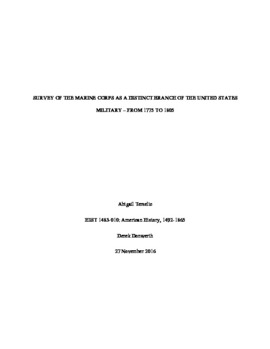| dc.description.abstract | When the "shot heard 'round the world" sparked the American War for Independence in 1775, the emerging American nation was rattled, but only for a moment. The iron will of the Colonial forces provided the foundation for unity against the British Crown. Initially, the Colonial militia did not compare to the British forces, which had a thriving mother nation backing them and a rich history in strong, successful warfare. However, as the Colonies matured in resolve, they gained support, personnel, supplies, and unity. In addition to increasing the size of the Continental army, the Continental Congress decided to create a completely new division of the armed forces, one with explicit purpose and manifest strength. Thus, two battalions of Marines originated as an elite arm of the Colonial militia. The Marines faced their first challenge in the War for Independence, as they demonstrated their unique training and abilities, fighting alongside the Continental forces. After the victorious American Revolution, the new nation maintained Marines as part of its general military force. Gradually, they were employed more and more, until they became an official branch of the United States military in 1798. A mere six years later, the Marines gained universal recognition and respect as a powerful, invaluable asset to the rising United States by their famous victory in the First Barbary War in 1805. From its first roots in 1775 to its famous victory in the First Barbary War in 1805, the US Marine Corps became known for selectivity of personnel, discipline within its ranks and the ranks of other forces, and effectiveness in eliminating enemies through amphibious assault and hand-to-hand combat, all of which set the Marine Corps apart in mission and effectiveness from every other branch of the United States armed forces. | |
